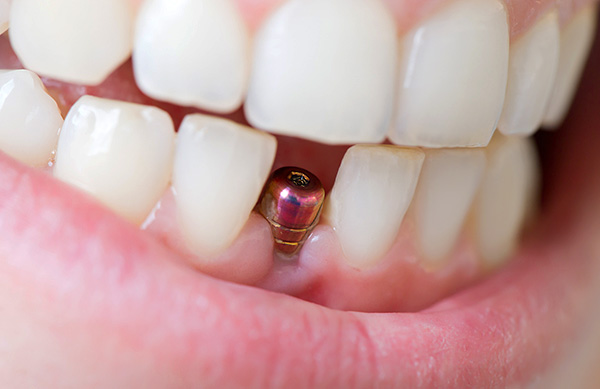
Next you will learn:
- How long does a tooth implant usually serve and whether it can really stand safely until the end of life, as is sometimes stated in advertising dental clinics
- What is the difference between the guaranteed service life of dental implants, declared by the manufacturer, from the guarantee for implants that the clinic provides;
- What is the average real life of dental implants of different price categories;
- How to find out that the time has come to change the implant, and what factors can contribute to problems;
- But do prostheses installed on implants last as long, and why sometimes they have to be replaced a couple of years after installation;
- As well as a few simple practical tips that will extend the life of dental implants ...
Dental implantation is a rather expensive procedure, and therefore the desire of patients to receive a lifetime or at least a multi-year guarantee on the implants installed is justified. At the same time, the advertising slogans of many dental clinics, it would seem, paint quite bright prospects and do not give reason to worry: “the life of our implants is 30 years,” “our dental implants will last you until the end of your life!” And others in the same vein.
But can implantologists really guarantee such a long service life of dental implants, and can it not happen that the established expensive design will have to be changed in a couple of years?
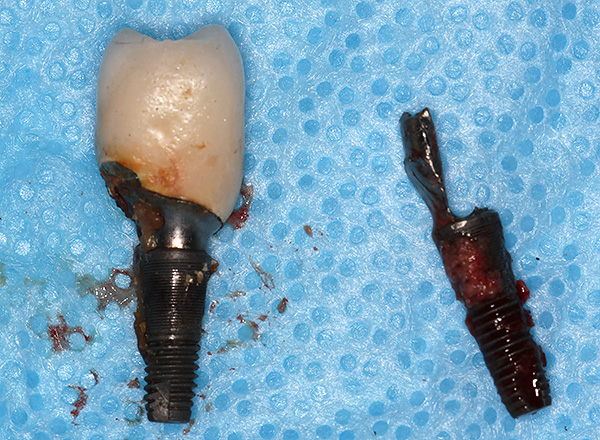
In order to better understand how much a tooth implant actually serves, let's first see how the guarantee for dental implants that clinics provide differs from the manufacturer’s lifetime. And then we’ll also talk about whether it is realistic to achieve lifelong results in the operation of artificial teeth.
What is the difference between implant warranty and their service life
So, there are two important concepts that are closely related to the life of dental implants:
- Warranty on the product (service life), which is established by the manufacturer of the implant;
- As well as the warranty period for the performed treatment work, established by the clinic.
Warranty and service life from the manufacturer
Many companies, especially the most serious and existing on the market for more than a decade, give a lifetime guarantee on the manufactured dental implants. These include mainly manufacturers of expensive premium products: Nobel, Alpha BIO, AstraTech, XIVE Friadent, Straumann and some others.
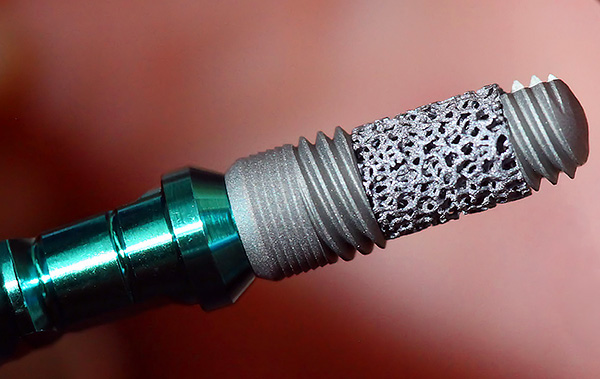
Firms that produce less branded products (mid-price segment) give a guarantee on their products in 20-25 years. Actually, this is the guaranteed service life of dental implants of the middle price category, however, provided that they are installed and then operated, as they say, in compliance with all rules and norms.
On a note:
Teeth on implants can be compared to an expensive car. For example, in German Mercedes’s you can easily drive over 500 thousand kilometers. But provided that the owner will conduct regular maintenance of the car, change oil, candles and other spare parts. The same thing with new teeth - in theory, implants will last several decades. But in practice, a lot depends on how professionally the doctor worked, as well as how the patient will exploit new teeth. An important role is played by daily care, regular removal of dental plaque (yes, plaque accumulates on artificial teeth), as well as the passage of preventive examinations at the dentist.
If all conditions are met, even mid-priced implants can hold their jaw securely and serve longer than the declared 25 years, and it is possible that they will never need to be changed.
Dental clinic implant warranty
The second type of guarantee is provided directly by the dental clinic (or even by a doctor if he works individually). And usually the duration of such a guarantee is only 1-2 years. Generally speaking, the legislation of the Russian Federation does not regulate the terms of warranty for dental services, so each clinic installs them independently.
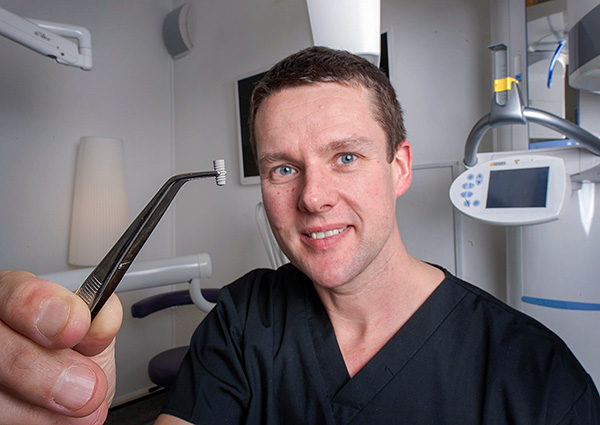
A reasonable question arises, why do manufacturers give almost an eternal guarantee on implants, and doctors - no more than a couple of years?
Well, this is explained quite simply: the doctor (or clinic) can give a guarantee only on the work done. In practice, it is during the first 1-2 years that the risk is relatively high implant rejection for reasons beyond the control of the patient, namely the fault of the implantologist.
But if the implant has to be removed and replaced after 3-5-10 years, then the problem, as a rule, lies in the lack of proper care for artificial teeth or in the deterioration of the patient’s general health. It is quite obvious that the doctor’s fault is absent here, and therefore, there is no reason for extending the guarantee for such a long period. That is, to guarantee the eternal service of implants to a person who does not brush his teeth or bites nuts every day is more expensive for himself.
In general, we can say that when it comes to implantation guarantees, the patient of the dental clinic is not always in a winning position. According to statistics, most problems with implants still occur due to the fault of the doctor - due to inexperience, carelessness, improperly selected design or completely incorrectly performed surgical operation to install the implant. However, in practice, to prove that the cause of the problems lies precisely in the specialist’s mistake and that during the warranty period he is obliged (and this should be prescribed in the contract) to replace the implant, alas, is not always possible.
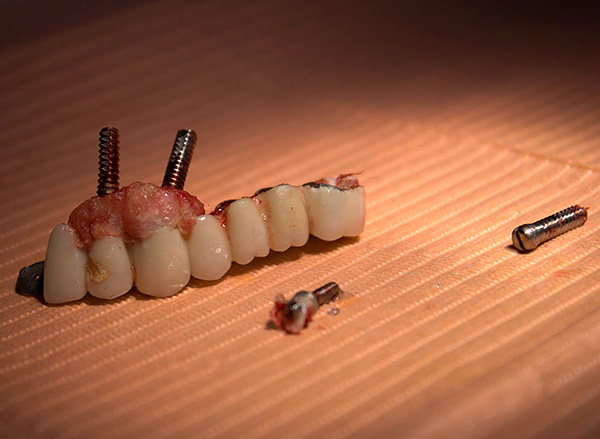
As a result, many patients who have experienced complications after implantation, seek support from specialists at other clinics. For example, the implant became painful, mobile, or completely fell out of the bone - such situations of the clinic are often not regarded as guarantee cases, blaming the patient. However, some doctors honestly admit their mistakes and successfully eliminate them - changing a failed implant or offering the patient a different type of prosthetics without paying for the treatment again.
Feedback:
“I installed a German expensive implant on the six. The operation went well, almost without discomfort. I immediately asked how long this dental implant lasts and how long it lasts. The doctor said that 15-20 years will definitely stand. But in fact it turned out to be completely different ... A month later, severe pain, swelling and redness appeared. I came to the clinic, they said that it took a long time! Like, the rejection has begun and the reason can not be established, most likely, improper hygiene. The implant was removed and flatly refused to re-undertake anything. Then I turned to another clinic - they said that the reason was that the implant was too long and was crooked. Here you have the expensive implants, but the doctor’s hands do not grow from there! .. ”
Irina, Moscow
So the service life of even the most expensive dental implants in problem situations can be calculated in just a few months. Moreover, numerous reviews on the Internet suggest that such cases are not so rare. And the patient, unfortunately, has to undergo treatment again in another clinic and spend a lot of money again.
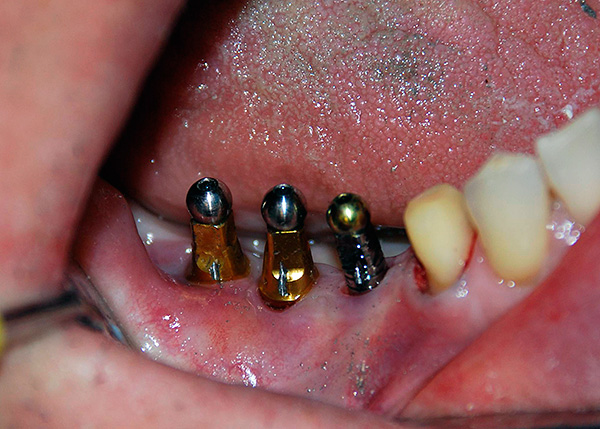
Here are some practical tips to help you reduce the risk of a clinic losing its warranty:
- choose a clinic that has long been on the market, values its “name” and tries to maintain a positive reputation;
- in dentistry, everything should be provided for implantation: diagnostic equipment, the presence of implantologists, surgeons, as well as orthopedists who can make dentures that are mounted on implants;
- Choose an experienced doctor who has performed more than one successful implant placement operation;
- study reviews not only and not so much about the clinic, but about the doctor - both on the Internet and in the book of complaints and suggestions (you can check with the administrator of the clinic about its availability);
- visit a few free consultations - compare the opinions of experts regarding your situation;
- strictly follow all doctor's prescriptions and do not miss routine examinations;
- do not chase cheapness - implantation, by definition, cannot be too cheap, and a significant part of the price is made up of expensive implants.
Speaking about the life of the implants, it is worth recalling that the titanium “screw” screwed into the jawbone is only part of the entire structure, which also includes the abutment and the prosthesis itself (for example, a crown). What is what - is clearly shown in the photo below:
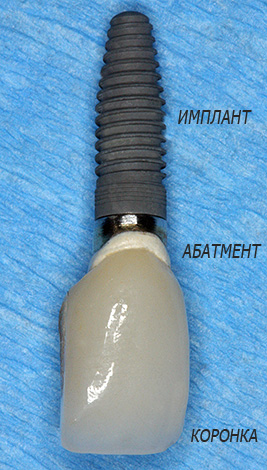
So, it is useful to keep in mind that the life of prostheses can be several times shorter than the life of titanium implants themselves. We will talk about this in more detail below.
So how much does a tooth implant actually serve?
In our country, dental implants appeared no more than 20 years ago, and the stage of active development is even less. Therefore, a rare dentist can boast of at least 10 years of dental implant placement experience. So, finding out exactly how long the implants will have to be replaced in case of their successful engraftment and normal operation is quite problematic - such statistics have simply not yet been collected.
However, implantation has a longer history abroad. So, for example, in European countries, the first operations began to be carried out as far back as the 60s of the last century, which makes it possible to trace statistics over a sufficiently long period of time.
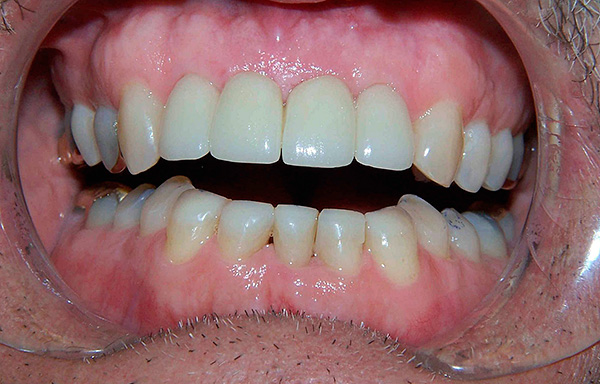
It is interesting!
According to foreign practice, the highest service life is observed for implants of the premium segment - Astra Tech, Nobel, Straumann, XIVE, Ankylos, Bicon. They hold on average without any problems for at least 20 years. For about 10-15 years, middle-class implants have served - for example, brands such as Implantium, BioHorizons, MIS.
But these are just average statistics. As inexpensive implants can last until the end of their lives, the most advanced systems can become a problem just a couple of years after installation (or even earlier). Each case is individual, and the real “shelf life” of implants depends both on the patient’s health status and his responsible attitude to new teeth, and on the professionalism of the implantologist who performed the prosthetics.
Above we were talking primarily about classical dental implants. The service life of today's popular basal implants (that is, those that are installed not in the loose surface part of the bone, but in its denser basal layers) is generally comparable with the classical ones. Today, those models of basal implants that were inserted through a lateral incision in the gum are practically a thing of the past - they were often torn away after 2-3 years, not withstanding the load from the prosthesis (see the photo below for an example).
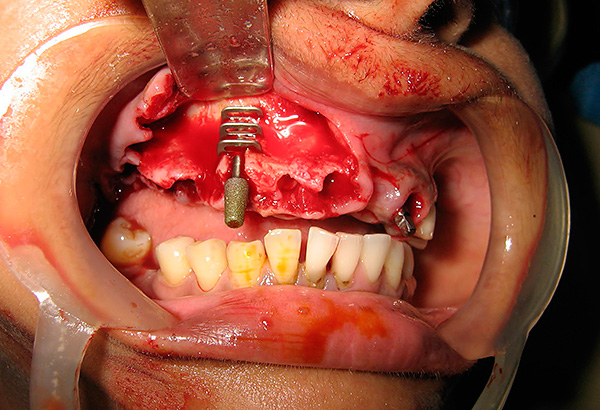
And although basal implantation began to be practiced in Russia not so long ago, today there is every reason to believe that, given adequate oral hygiene, modern designs can last a person for decades.
Even implants placed in a weakened bone, for example, with periodontitis or periodontal disease, can safely serve for many years (when conducting daily thorough oral hygiene and, possibly, annual drug therapy).
As for the service life of the so-called mini-implants, according to the manufacturers, it is similar to the life of classic implants and is on average 20-25 years. However, to trace this in practice is not yet possible, since mini-implants are installed no more than 10 years. Moreover, reviews about them vary: some experts believe that this is an excellent (and inexpensive) opportunity to fix inconvenient removable dentures, although some doctors do not recognize these systems.
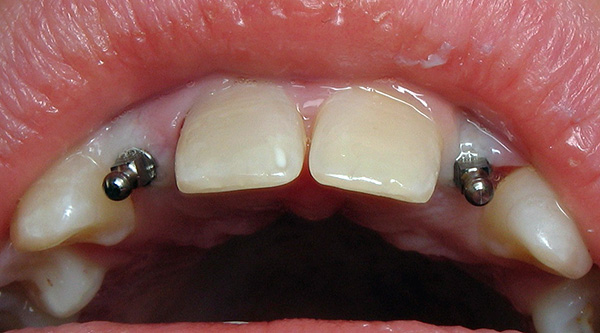
On a note
Mini-implants are not inserted into the bone, but into the periosteum (the tissue between the bone and the gum), which is why the bone tissue does not receive sufficient chewing load, atrophies and sags. As a result, you have to constantly adjust the prosthesis. And the position of mini-implants from excessive load sometimes changes, which can lead to their mobility, rejection and the need to remove even a couple of years after installation.
How to find out it's time to change the implant
To understand that it is time to change the implant of a tooth, only a doctor can determine. It is important only to regularly visit your attending dentist (1-2 times a year) to assess the progress of implant engraftment and to examine the condition of the tissues around it.
Generally speaking, the need to change implants usually arises only when any serious problems and corresponding symptoms appear. Moreover, such problems can arise both a year after installation of the product, and after 10, 20 and even 30 years of its active use.
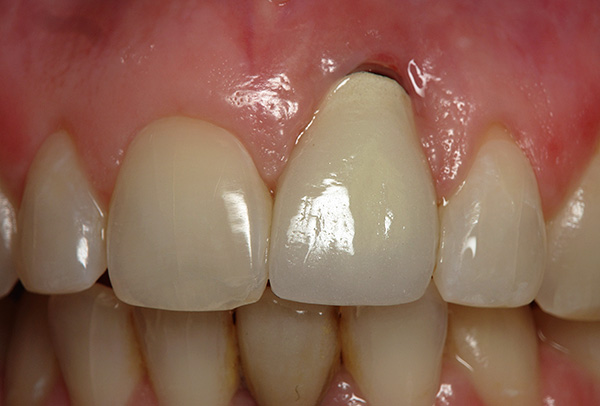
If you do not feel any pain, discomfort or other problems associated with the previously installed implant, then you do not need to change it.
Here are typical causes of implant replacement that are most often found in practice:
- trauma to the jaw or tooth, in which the mobility of the implant appeared. The design can also push deeper into the jawbone, or, conversely, get out;
- peri-implantitis (inflammation of the tissues around the implant): usually accompanied by redness of the gums, pain when pressed, pus may be released and an unpleasant odor from the implant may appear;
- implant rejection - occurs as a result of peri-implantitis. A characteristic feature of the problem is also the mobility of the implant.
Thus, with the appearance of mobility (even insignificant, which sometimes can only be assessed by a doctor with the help of special devices), the appearance of edema and redness of tissues, pain in the area of installed dental implants - it is likely that the design life is coming to an end.
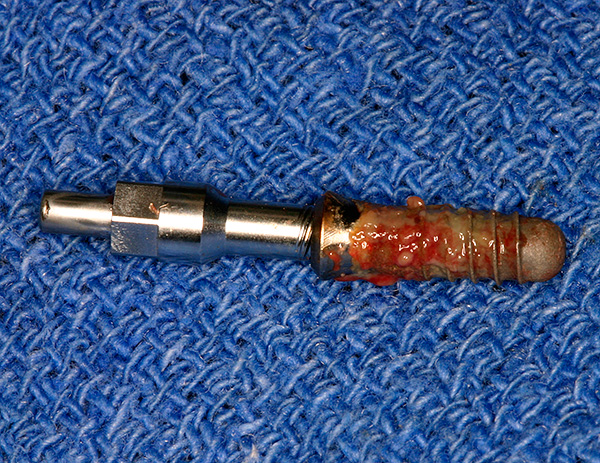
How long will it last and how long does it take to remove a mobile tooth implant? If the doctor says that it is time to change the implant (and this usually happens when mobility is detected), then you need to do this as soon as possible. Otherwise, tissue inflammation can lead to serious complications, even those that can threaten the patient's life.
As a result, a surgical operation is performed to remove the movable structure: the prosthesis is removed, the gum is cut and the implant is removed from the jaw. As a rule, then, after about 1-2 months, re-implantation is possible. In some cases (depending on the reason for the removal of the implant), the patient may be offered a different method of prosthetics.
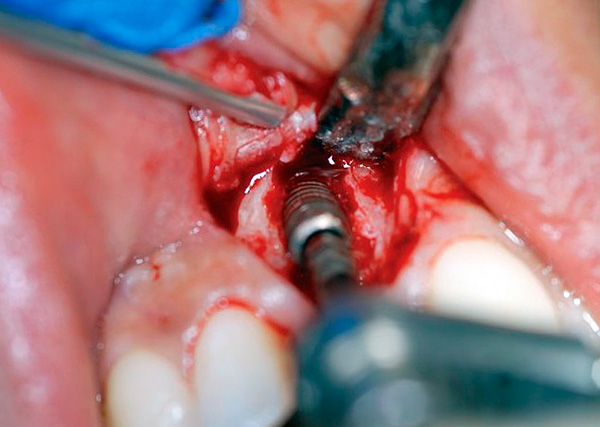
On a note
It must be borne in mind that in the case of prosthetics on implants, problems can arise not only with the "titanium screw" implanted in the jaw, but also with the external part of the structure - the prosthesis itself, whose durability is often lower than that of a metal implant. We will talk further about how many such prostheses on implants change.
Will the prosthesis last as long as the implant?
So, a metal implant implanted in the jawbone can become mobile (tear away) over time due to inflammation of the tissues around it.Now let's see how things are with the operation of the outside of the structure — with the prosthesis, and how soon it may need to be replaced.
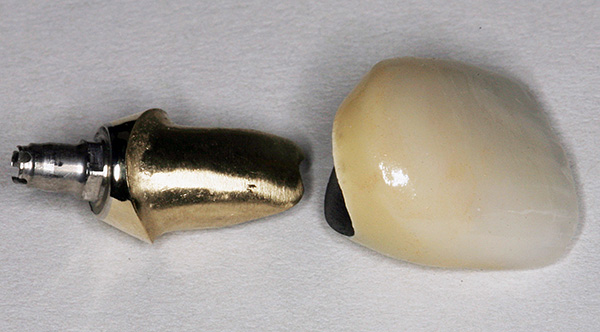
First of all, you need to keep in mind that the life of the prosthesis on implants substantially depends on the material from which the crowns are made. The most short-lived are prostheses made of metal coated with plastic (metal-plastic crowns) - plastic is relatively poorly attached to the base and often cracks and breaks off under load.
In addition, plastic is a porous material and absorbs food coloring, as well as the smallest food debris; as a result, the color of the crown changes, it becomes a hotbed of bacteria. The service life of such prostheses from metal-plastic is no more than 2-3 years.
Cermet crowns are much stronger and more durable. They serve an average of about 10-12 years. Among the main problems of these prostheses are chips of ceramic enamel and cracking on the external coating (however, in order for such defects to form, the load must be very significant, much greater than in the case of crowns made of metal-plastic).
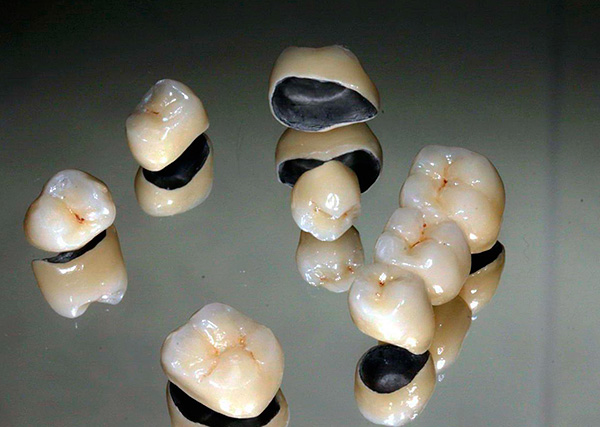
In addition, both in the case of metal-plastic and metal-ceramic prostheses, patients often experience allergic reactions to the metal (usually to low-cost alloys, so the problem can be partially solved by the choice of precious metals, although this is a very expensive option).
Dentures made of zirconium dioxide are considered to be the most perfect and durable - this is a very strong, aesthetic and non-allergenic material. In this case, with the service life, everything is quite simple: how many years the titanium implants will stand, almost the same prostheses made of zirconium dioxide will also stand (the claimed service life is at least 15 years).
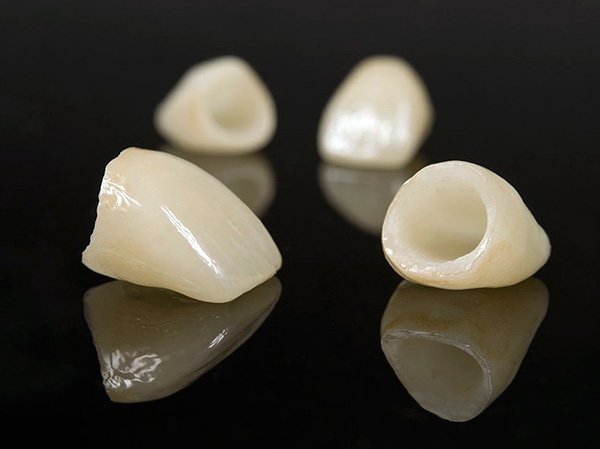
On a note
If any prosthesis breaks down, the implant does not need to be removed. Crowns are removed (in some cases - together with the abutment, especially if it is not template, but individual), then casts are taken again and a new prosthesis is created.
What ultimately depends on the life of the tooth implant
Based on the foregoing, the following summary can be made: in many cases, a modern dental implant is able to reliably last until the end of life, and at least not less than the service life declared by the manufacturer. However, whether everything goes well depends on a number of conditions, the key of which are:
- the professionalism of the implantologist and the correct installation of the implant;
- the professionalism of the orthopedic surgeon who takes part in the manufacture of the prosthesis (the correct load on the implants from the side of the prosthesis, its exact fit to the gums and implants is very important);
- high quality of the implant (today, by the way, there are Chinese dental implants, the quality of which is not always predictable);
- adequate oral hygiene and care of implant prostheses on the part of the patient himself;
- general health of the patient.
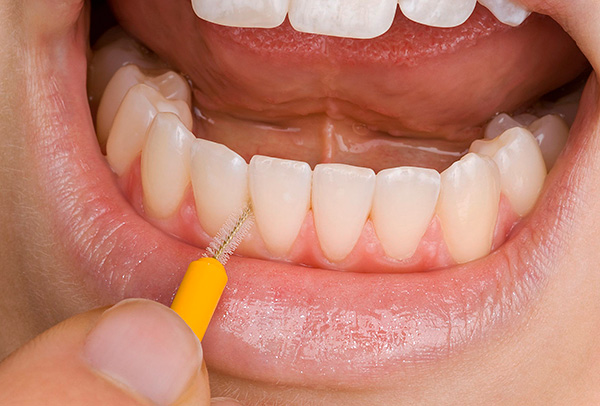
Implantologists note that many patients, after complete implant engraftment and installation of permanent prostheses, unfortunately, forget about hygiene and regular preventive examinations, believing that artificial teeth, unlike natural ones, are not attacked by bacteria - they say, they are artificial, and therefore "Inedible" for bacteria.
Yes, caries does not form on crowns made of metal, plastic and ceramics, however unwanted dental deposits may well form. In addition, artificial teeth are surrounded by living tissues, inflammation and damage of which, including due to the time not removed dental deposits, can lead to a reduction in the life of the implant and the need to remove it with the crown.
So, as you can see, how long the dental implants will last, largely depends on the patient himself.
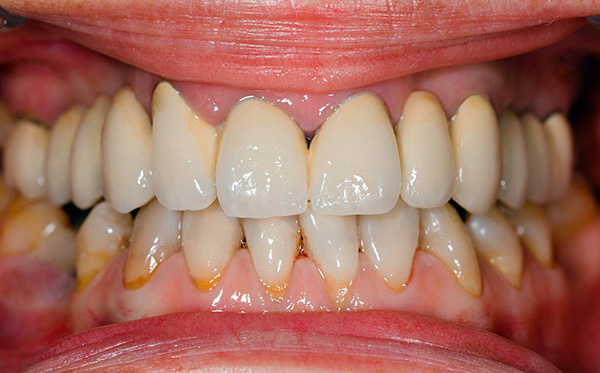
On a note:
Implantation is a rather expensive procedure, and not every patient can afford to update installed implants every 5 years. Therefore, money in this situation is a good motivator for a careful attitude to your teeth.For example, many patients after implantation generally quit smoking, since this bad habit as a whole increases the risk of implant rejection.
Useful tips for extending the life of dental implants
So, the implants are installed. We assume that all contraindications to treatment were excluded, and artificial teeth found their place in the jaw, like relatives. The rest is up to the patient himself.
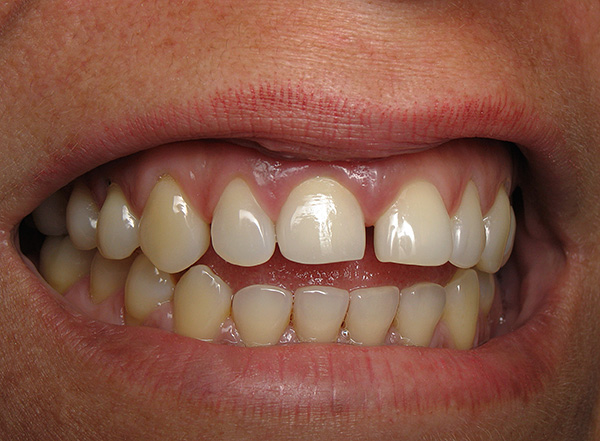
Here are some useful tips that can help you significantly increase the chances that a tooth implant will have a maximum life - until the end of a person’s life or at least 10-20 years:
- regular enhanced oral hygiene. In the morning and evening - brushing and pasting, it is also advisable to use irrigators or special interdental (interdental) brush brushes. After eating - removing food debris, and usually do not recommend using dental floss, as it can lead to damage to the mucosa and prosthesis. It is better to use an irrigator. Special attention is given to the gums; their inflammation must not be allowed;
- Quitting smoking - it adversely affects the condition of the oral mucous membranes, which, in turn, is fraught with the risk of metabolic disturbances in the tissues around the implant and its rejection;
- Limiting the load on the implant and prosthesis (do not bite nuts, do not open the bottle with your teeth);
- 1-2 times a year it is necessary to remove dental deposits - plaque and stones, since they can provoke gum inflammation;
- Needless to say, the face and jaw must be protected in every way from injuries;
- At least once a year - preventive examinations at the dentist to assess the condition of the dentofacial system. Such examinations sometimes allow you to timely identify the emerging problem and not bring it to the extreme.
If you have personal experience with prosthetics on implants, be sure to leave your review at the bottom of this page, telling you if everything is wonderful in this regard, or if you have any problems.
An interesting video about removable and fixed prostheses and which is better - implantation or crowns?
Why Dental Clinic Should Not Guarantee Dental Implant Results

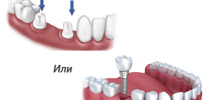
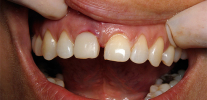
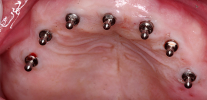
The most expensive thing in our life is the treatment by dentists ... And they are still not responsible for anything? Why I began to look at your articles today, because Today they put crowns on implants for me ... It seemed that everything was fine and the doctors were picking up with experience ... But when taking the impression for the crowns, he unscrewed the plug, it smelled, and I told him, but he explained that this was done with tweezers. And today again the same smell when installing the implant. I’m reading now, your site says that it’s not normal. I told him again, but he did not explain anything and set it. And what to do in this case?
Good afternoon! Regarding the fact that doctors are not responsible for anything - it's you for nothing! When contacting the clinics, you conclude an agreement, under which the liability of the parties is stipulated, including for warranty obligations.
I don’t know what kind of smell started initially, but I can assume that if it alerted you, the smell was not “medical”. The doctor’s response “... from tweezers” is surprising - was the tweezers not sterile? The sterile instrument does not smell suspiciously.
If the smell was nevertheless of a "medical" nature, then everything is in order - sometimes medical solutions may seem unpleasant to the patient. People are all different.
Regarding what to do, I recommend that you consult another doctor for advice, or ask your doctor to clarify the nature of the smell, take a picture and make sure for your own peace of mind that everything is in order.
Hello! Thank you for your reply. I’ll talk to the doctor again ...
1.5 years passed, and I had a crown. An implant was placed for 30 thousand rubles. The doctor did not tell me anything about the timing, what the crown stands for, etc. The document about what the doctor did and what he set did not give. Now he has left this clinic. I opened my own. I turned to him. He said that almost 2 years had passed, but he was redoing something now. I have to pay for the work again.
Antonina, hello. Warranty obligations are determined by the clinic, mainly a year or more. The legal responsibility for the work performed lies with the clinic where the installation of the implant was carried out. As part of the warranty, the clinic provides a doctor (former or different - at the request of the patient), who redo the work. In your case, not only are there no documents confirming the treatment, but, in addition, you have turned to another clinic to fix the problem, but to another. Most likely, you will have to pay for the treatment again.
As for the reason for the misalignment, which led to the loss of the crown - without presenting the entire clinical picture, it is rather difficult to tell. This may be an understatement, temporary setting with insufficient force when unscrewing the screw, etc.
Hello. My implants cost very well about 4 years, but the crowns and heads constantly required screwing. The last time, when we decided to replace the heads, we saw on 2 adjacent implants (Israeli) splinters of pieces. Now, after 2 months, the gums began to abscess and pus forms, since there is no tightness in the implant-head connection. I think that the reason for unscrewing the heads was just because of the breakaway pieces of the implants in the upper part. Is it possible to leave well-implanted implants, for example, twisting the heads and using filling material for sealing? Now heads with increased torque of 40 Nm are twisted. How will the head-implant connection with the filling material behave?
Hello, hello. In your case, there may have been a flaring of the internal hexagon of the implants during installation. This can happen in the case of a very dense bone, where the doctor needs to more carefully create a cavity in the bone for the future implant, so as not to exceed the effort when installing it (screwing).
Your proposed option for cementing screws and abutments is unacceptable, because the exit of cement beyond the boundaries of the implant will only aggravate the situation - it will lead to reimplantitis and bone loss. In this case, the replacement of implants is necessary, in compliance with the surgical protocol and subsequent prosthetics.
After three years, as the implant and prosthesis were installed, the prosthesis began to fly off the implant. I come to the clinic, they put a prosthesis (crown) on the cementing compound of Fuji. A month later, the prosthesis again flies. They put it on Fuji again, after a month the prosthesis flies. Now every week (already 4 times) I go to the clinic and again they put a crown on Fuji.Tell me what should I do? Making a new denture? At whose expense? And is there a warranty period for the installation of the prosthesis? Every six months (for ten years) I go to this clinic for a routine examination and removal of plaque from my teeth; there were no comments from the doctor on oral hygiene.
Hello, Victor, in your case it is necessary to assess the condition of the implants for their suitability for re-prosthetics at a face-to-face examination by an implant surgeon and orthopedist. Apparently, the height of the abutment is not enough, or the accuracy of the landing of the crown to the abutment. More precisely, it can only be said upon examination.
To avoid such problems in the future, consider the option of prosthetics with screw fixation. What is your implant (firm) worth? Now almost all systems have abutments for both cement and screw fixation.
The warranty period, unless otherwise specified in your contract, most likely has already passed, as standard in most clinics is 1 year. Therefore, for reinstalling the abutment and crown, most likely, you will have to pay again.
Thanks for the information.
Hello. A year ago, she installed an implant on the fourth upper tooth (a prosthesis made of zirconium dioxide) in an expensive clinic with a good reputation. But the prosthesis burst in half (the same way as once a native tooth - along the entire length). One half (cheek) walks with a shaker, and the other (from the side of the tongue) stands firmly. Tomorrow I go to the surgeon, and then to the orthopedist. Nothing was said about the guarantee, I was invited to the inspection six months after installation. I didn’t think that such an expensive procedure would last only a year! I’m disappointed that the prosthesis burst without any special load on it (popcorn). What to expect next? Fearfully…
Hello, Elena. Not knowing all the details of the situation, it is difficult to judge, but I can say that zirconia really has the ability to give chips under excessive loads. It is best to install Prettau solid zirconia crowns - they are stronger. In particular, in popcorn there are small and very hard grains, when bitten, which creates a point pressure on the teeth. And at the contact point, a significant overload is obtained - this is where a chip is possible. Given the experience of your own tooth (which, as you write, has also been chopped together) - most likely, it’s the bite. You need to contact the orthopedist gnatologist, or go through a joint consultation with the orthodontist, take the parameters of the occlusion, and then it will be clear how best to create a new design taking into account the deviation.
Regarding the guarantee: usually its conditions are spelled out in the contract, and each clinic has its own. But as a rule, a guarantee is issued for 1 year. You have a 100% guarantee case, the only question is whether the guarantee is valid at the moment, as you write that a year has passed.
Two months later, when the implant was installed, the crown flew off. I came to the doctor, he said that the teeth are small and with a bias that they will periodically fly off. I think this should not be so.
Hello Marina! Not seeing the whole situation in the oral cavity and based only on the data received from your message, I can assume that the crowns were installed with cement fixation. I believe that you need to think about screw fixing the crown to the implant abutment. Screw fixation provides a rigid reliable connection of an orthopedic design, which means that the crown will not fly off.
Eleven years after three consecutive implants were installed on the lower jaw, and instead of chewing teeth. Crowns - cermets, welded together (as explained, so as not to get out). Russian implants - took root normally.My girlfriend was more complicated - although the implants were German, at that time it was three times more expensive, and the implantologist and orthopedist had an internship in Germany.
My implants are 3 years old, chewing on the lower jaw on both sides. Moreover, there are two implants, on which 3-4 crowns (like bridges). I didn’t feel any pain or rejection, but recently, on the right side of the crown, I began to feel hot water (tea). How did non-living teeth become sensitive? What does this threaten? I really do not want to be in the dentist's chair again, so I began to search for information on the Internet (
Hello Svetlana! For an accurate answer to your question, you need to look at the clinical picture in the oral cavity. It is possible that the gum gives such sensations. It is possible that under the bridge structures the gum has lost its density due to lack of load. As a result, food debris began to accumulate in the formed space, inflammation arose during their decomposition - hence sensitivity appeared.
It is necessary to consult a dentist for examination and further eliminate the causes of discomfort. If everything is in order with the implants, then the doctor will conduct hygiene under the bridge and prescribe appointments to relieve inflammation and strengthen the health of the gums. For the future: I recommend every 6 months (especially because of the presence of implants) to undergo a regular examination at the dentist and preventive oral hygiene.
Thanks for the answer 🙂 I went to the clinic, in my case it turned out that the bite was not very even! The doctor was even surprised how long I went with him, he sawed a little there, a week later he sawed it again and ... Not immediately, but the pain and sensitivity to the hot began to disappear!
Hello! I'm going to remove the tooth with the subsequent installation of the implant. There was a crown, the tooth was completely destroyed, inflammation is visible in the picture (everything was calm before the destruction, nothing hurt!). In addition to removal and curettage, doctors are going to do a “blood sampling for bone grafting”, the price is 3000 rubles. (tooth top right 5, offer implant OSSTEM). What can you say about this? Thanks in advance!
Hello Dmitry! Such a procedure is not uncommon: remove the tooth, put the implant at the same time and make a small plastic, after mixing the bone material with blood. In addition, doctors can use your blood to make the PRF membrane. PRF is platelet-rich fibrin (fiber). It is specially prepared from the platelet concentrate of the blood of the patient himself. At the stage of the examination, blood is taken into a test tube from a vein (as in the usual analysis) and placed in a centrifuge, where it is divided into red blood cells, a fibrin clot and platelet-free plasma. The fibrin membrane has a high potential for stimulating the growth of bone and soft tissues, as it is rich in leukocytes and growth factors of cells lining the walls of blood vessels.
As for the South Korean implants OSSTEM - in our clinic we also use them, implants show good survival rates. The doctor made the right choice regarding this brand, I have nothing to add, except to advise installing the crown on a screw fixation.
2 years ago put implants. I did not immediately notice that the teeth are short - the tongue is between the teeth all the time. When I grit my teeth, my lips disappear. Here's a problem, what to do?
Hello! I believe that the matter is not in implants, but in the prostheses that are installed on them. Usually the service is covered by a warranty of up to several years. The only question is whether your unusual case falls under the warranty situation. Very unlikely, but worth a try - anything can happen.But even if the case is not a guarantee, you will be happy to remove “short” (from your words) constructions for your money and (as far as it is realistic by bite) make “long” so that nothing would cause discomfort.
Hello Vera! It's pretty hard to imagine what you're talking about. An orthopedic examination by a gnatologist is necessary in order to clarify the features of your bite. The occurrence of this problem due to implants is unlikely - most likely, this is a general malocclusion. You can also send us your picture and photos (to the site's mail) - we will comment in more detail.
Hello, today I will remove the six on the upper jaw, the tooth has been dead for a very long time, but the cyst torments, periodically becomes inflamed. In his place I want an implant, but the doctor said that you need to build a bone, because she is thin. I don’t really want to do this procedure, I heard about basal implants that are bent to the side. Is it possible to carry out the procedure with such an implant? And which manufacturer of implants is better to use?
Good afternoon, I would recommend that you pay attention to Straumann implants, and not to the basal implants in this case. A special line of Active Roxolit is designed just for such cases + a special coating of the implant will speed up the process of osseointegration. And in your case, I would install such an implant at the same time as filling the lack of bone material. Such implants take root in 4 weeks, and then you can put a permanent dental crown.
I can answer in more detail if I see the full clinical picture - perhaps there are other options. If you wish, you can make an appointment with me through my doctor’s card.
As a result of unsuccessful prosthetics, I developed purulent inflammation in the bones of the upper jaw. She returned to the clinic and the structures and affected teeth were removed, an operation was performed to install Konmet implants with the installation of a bridge on the upper jaw. So far, nothing is bothering. Can these terrible consequences come back again?
Good afternoon! If the work was carried out efficiently and you are constantly observed by a doctor, follow all the recommendations, then the probability of complications is minimal. And then, as a rule, for force majeure reasons (accident and trauma, a sharp decrease in immunity, serious diseases of the body as a whole).
No need to think about the bad, set yourself up in a positive way. Your fears can lead to stress, and stress, as you know, leads to a decrease in immunity.
My teeth grew incorrectly, at the top there are only two incisors very wide, between them there is a gap, and one underdeveloped one (it looks like a fang, but thinner), both fangs are in place. The aesthetic appearance is terrible. Tell me, how can I fix this?
Good afternoon, Jan. This problem occurs quite often and is called a violation of the development and teething. The reason, as a rule, is a violation of the formation of dental rudiments during the period of intrauterine development, or in early childhood (infancy). In such a situation, treatment should be comprehensive and should be started with a consultation with an orthodontist. Then, if necessary, other specialists are involved, such as an orthopedic gnathologist, an implant surgeon. Before consultation, it is advisable to conduct an X-ray examination (OPTG and TRG). These pictures will give the doctor a full understanding of the whole situation (the clinical picture), after which it will be possible to talk about correction options.
Hello! The front tooth was removed on the lower jaw, because after an unsuccessful prosthetics (an insert was placed in the root of the tooth and a crown was placed on top) there was inflammation.1.5 months after the removal, the doctor placed an implant, and the next day says that you need to grind two teeth under the crowns, which are nearby - so that the design is more durable. I'm in a panic, what should I do?
Hello, Natalia. As a rule, such a treatment tactic is chosen by the doctor when it is planned to install a bridge with support on his own teeth. But since you already have an implant installed, which implies a single restoration without any bridges, the current treatment is not entirely correct, that is, crowns on their own teeth and crowns on implants are not recommended to be combined into a single design. Own teeth have micromotion, which can negatively affect the implant, and one of the main advantages of implantation is the lack of the need to affect neighboring healthy teeth.
I recommend that you consult another 1-2 specialists (preferably in another clinic - to get an independent opinion). And then make a decision.
An implant was placed 7 months ago, a crown 4 months ago. Fastened with a screw, and closed with a filling material on top. If you look at the tooth from above (it is the lower one), the dark screw is slightly visible, but not critical. Overall satisfied.
Hello! A week ago, they put implants in me and the doctor put a seal on the crowns. And besides, they seem to shine through, the gray color inside is visible from below - the implant itself. This bothers me very much, the crowns are imperfect and short in comparison with the left side. And is it really possible to immediately place fillings on expensive crowns? The doctor explained that this was normal, but I hadn’t even heard of this.
Please advise what to do? Thanks!
Hello, Elena. In your case, the crowns are installed with screw fixing. It is normal and correct that the doctor used special material to close the mine. The fact that the abutment shaft is visible through a temporary seal indicates that the glass-ionomer filling material is selected with insufficient opacity (opacity). This problem is corrected by the selection of the appropriate shade and opacity filling material, so contact your orthopedist for another adjustment.
Regarding the height of the crowns: if you had implants placed just a week ago and already installed crowns, it means that you restored your teeth according to the protocol for immediate loading of implants with prostheses. In this case, in the first year, the crowns are slightly removed from the bite so as not to overload the implants and not cause their mobility. You should wear such crowns until the implants are fully engrafted (from 6 months to 1 year), and then the crowns are replaced with permanent ones and inserted into the bite at stage 2, which is called re-prosthetics.
Hello. I have been doing basal implantation for a year now. All teeth were removed. Below are 10 implants, and nothing really bothers. If it just bothers, it’s getting food under the prosthesis. But there are terrible problems with the top. It costs 8 implants. One side took root well, and the other did nothing. Several times (2 times) were removed and reinstalled. There was severe pain. Last time, 2 weeks ago, everything was done in a new way. And for some reason, the prosthesis was also made differently: without a metal beam, but simply from one plastic. And for some reason they did not fix it (they did not put it on cement). They said not to cut it later, if that. The prosthesis is ugly, it spoils the appearance. Impression, as if I have no teeth at the top. I'm at a loss.
They said that the final version, that so 3 times redone. New (different) are ready to do, but for the money. So I paid them a VERY large amount. I am in a panic. I do not know what to do.
Hello.When basal implantation, prostheses with a metal frame inside are necessarily used, since the implants must be fastened in a single structure by means of a metal base, which is located under the acrylic gum. Are you sure that you have a prosthesis without any metal inside? That would be weird. The metal frame of the prosthesis fixes the position of the implants, as a result of which the load on the bone tissue and on the implants themselves is distributed evenly. 1-3 years after the operation, the primary metal-plastic bridge must be replaced with a stronger structure - such as a bridge made of cermet, zirconium dioxide or metal composite. Such prostheses can be used for many years. But in any case, all these prostheses have a metal frame.
If the situation becomes critical, or the case again goes to re-prosthetics, you can always contact our clinic for a free consultation. First of all, it will be necessary to do computed tomography and determine the following important points before prosthetics: 1) assess the volume of bone tissue; 2) evaluate the position of the installed implants; 3) evaluate the bite and movement of the lower jaw in relation to the upper jaw. With this in mind, treatment tactics are chosen.
Hello! A year ago, they put me three implants from the bottom right (four-six). After the operation, it turned out that I had numbness of the lower lip and partly the cheeks on the right. The doctor looked at the pictures and said that the jaw nerve was not hurt and, possibly, the nerve process (if I remember correctly) was damaged during the operation, which should be restored after some time. A year passed, but the numbness did not go away, a speech impediment appeared. I can’t put crowns on implants due to the fact that when pressing on the gums, unpleasant and sufficiently strong “goose bumps” appear (the sensations are very similar to those when you “sit out” your leg). The clinic insists on speedy prosthetics. Maybe you can tell me my further actions? Thanks for the answer.
Hello. The situation is not easy, therefore, I recommend that you consult another specialist, this is at least (but not in absentia, but at the reception). There is no need to prosthetically. What happens to you is called paresthesia, it can occur either with compression on the channel where the nerve passes, or with damage to the integrity of the nerve. However, it is unlikely that the integrity of the nerve is broken in you - most likely, the implants exert a pressure on the channel. My opinion: they need to be removed, allowed to recover the nerve, and then reinstall the implants, taking a slightly smaller size.
How long do implants last on average?
Hello Nick! The service life of an installed implant can vary within a fairly wide range and largely depends on the patient. In this case, it is necessary to distinguish between the concepts of the life of the crown on the implant and the service life of the implant itself.
The average life of crowns is 5-7 years. With proper care and regular visits to the dentist, observing the schedule of preventive examinations, the implant can serve for life. As with naturally occurring teeth, problems can arise if you do not follow oral hygiene.
Hello. For seven years, the Alpha Bio implant was used instead of the lower six. Three times the ceramic crown was changed for (17,000 rubles each time). The last one was screw (six months), and the bone around the implant settled, it is mobile, it needs to be removed. Two crowns were glued to Fuji, they fell off every six months, and with a screw, the bone resorbed. If everyone explained seven years ago that the costs would be 20,000 rubles. implantation + three crowns, then I would not put an implant.
The denture guarantee has passed, right? After seven years, the manufacturer must change his implant. If so, then I already live in a different place, not where I installed it. What fly there? Are there any statistics in Russia, how much is the bone into which we are implanting?
Hello, Natalia. Alfa-Bio implant manufacturer does not guarantee implantation for patients. The manufacturer only declares that the service life of the product is 10-15 years. It is the clinic that gives the guarantee for work, and if the guarantee has already passed, then it makes no sense to fly to another city in the hope that they will carry out the necessary work for free.
Statistical data on how much bone “serves” is not available in the literature, since the state of bone tissue and adjacent teeth is different for everyone. Different levels of hygiene, different health conditions.
As for the bone loss that you mentioned, I recommend that you think about an early correction of the situation until the bone loss reaches such an extent that bone grafting is required.
Natalya, I have the same situation. After 7 years, the bone began to settle - as a result, the implant was removed. As I understand it, an implant never fuses with a bone. It’s like an ordinary screw. Once screwed in, it costs well, but after 7-8 years under load it begins to loosen, and it is removed. In general, it is not necessary to hope that the implant will last more than 10. On average 7 years.
Hello! I want to put 4 implants on the upper jaw. Tell me, if I have type 2 diabetes, will they survive? Thanks!
Hello, Victoria. Dental implants in patients with diabetes are possible under certain conditions. Today, sugar can be adjusted - the result depends on the patient’s desire and discipline. And also an observation by the endocrinologist is mandatory throughout the entire period of implant engraftment. Fasting sugar should not exceed 7 mmol / L in the preoperative period, as well as throughout the entire engraftment period. You can get a free consultation at our clinic, the pictures during the examination are also free - on the basis of them, the doctor will be able to choose the best option for restoration of missing teeth.
4 years ago 5 implants were delivered. They took root very well, without any complications, but now 2 crowns have fallen together, they could not be put back. The doctor said that the ends of the implants broke off, you just need to remove the implants themselves. For what reason can the implants themselves break off? I want to say right away that I definitely didn’t eat nuts.
Hello, Tatyana. The reason the implant may break is mechanical overload. This is a significant load, since the titanium screw is not so easy to break. And unfortunately, in your case, the only right decision is to remove broken implants.
Hello. The implant stood for two years, after which the abutment with a crown on cement began to stagger. The doctor diagnosed the unscrewing of the screw holding the abutment. When trying to get to him, he said that he had to remove the implant. Warranty (1 year) is gone. Formerly MeDENT, now offer Implantium. Again with a one-year warranty. Claim a clinic or hope for "maybe"?
Hello, Andrey Yuryevich. According to the description alone, without pictures and additional data, it is difficult to assess the true reasons why the doctor had to remove the implant. However, if you have doubts about the competence (or good faith) of a doctor, it makes sense to consult another specialist in another clinic.
Normally, of course, the screw securing the abutment does not loosen itself. When contacting the clinic, it is worthwhile to clarify whether they have certificates for implants and their components.
9 years ago, she delivered an implant from Radix, with a ceramic-metal crown. Three months later, I unscrewed the screw. I went again, replaced for free - supposedly there was a defective party. After six months of use, the tooth on the implant began to stagger. Then there was such a period that there was no time to go to the dentists. Then she moved to another city. At year 8, the crown with the screw flew out. I went to the dentistry in a new place of residence, they could not even determine what kind of implant I had. Then I went to the second clinic, to the third, and already lost count, how much I had to get around, while in the last the dentist could understand what I had sewn there. But he said that he did not remember such implants for a long time, offered me to replace the implant and announced to me the amount of almost 50,000 thousand. Naturally, I did not agree. Then he took a screwdriver and again screwed in the screw that flew out.
After a couple of months, the screw came out again. Then I went to the city where I put this implant. They put a screw on cement there, and added that when they put Radix on me, then it was kind of a price, and now they are not even released, so it is not possible to find such a new screw. And whose fault is it? In general, I repeat that they put it on cement, I do not know how much it will withstand. But then either put a new implant or a bridge. Front tooth. It’s better not to mess with these implants at all. Although I have it very reliable, the implant itself. But the screw does not hold. It seems that the thread is normal, but something is not right. And like modern implants, there are also problems with screws, do they get out over time?
Hello Yulia. Situations when the screw connecting the abutment with the implant is untwisted are not the norm, but unfortunately they are not so rare (poor quality of products, insufficient qualifications of doctors). Nevertheless, when using a high-quality implant and original prosthetic elements, the issue is resolved quickly and painlessly. If the screw is tightened with the force recommended by the manufacturer, the likelihood that it will loosen is negligible. In addition, modern prosthetics methods involve the so-called screw-on crowns. This eliminates the presence of cement and facilitates access to the screw.
Hello. My teeth broke under the bridge, 4 and 5. The remaining teeth have not been around for a long time. The root in the 4th tooth is preserved. But the doctor suggests putting 4 crowns on 3 implants. I regretted the 4th root and made a crown on a new pin in another clinic. The root is small, but without inflammation. I thought that it would last for some time, and the implant can be made later. But the doctor says that 4 is the best tooth for implantation, and under the 5th the nerve passes. Therefore, we decided to remove this 4th restored tooth and put the implants on 4, 6 and 7.
Your opinion: is this correct? A tooth on a native root, or an implant - which is more reliable? I understand that since the 4th tooth has the most bone, it is best to use it to support this design. It is right? Or can I keep my native root?
Hello, Rose. Taking into account the description of your clinical situation, I consider the treatment plan chosen by your doctor to be absolutely reasonable and correct. I do not recommend preserving the root because of its potential unreliability due to the size and possibility of future inflammation.
Hello. My implants (Astra tech) are over 10 years old. The bone has gone a little, at most - 2 mm, but there is no threat of structural loss, everything is fine. Question: is it worth following the advice of a doctor and conducting tissue hygiene around implants using the Vector apparatus? In articles from scientific sources (PubMed), there is information that this method should not be applied to implants. The device manufacturer’s ad states the opposite. Who to believe?
Hello, Elena! Vector gum treatment with gum apparatus is a good procedure, after which the condition of the soft tissues around the implant really improves.The only point here is that the doctor must use a special nozzle for implants, which is different from that used for natural teeth.
I read the reviews and changed my mind about putting the implant!
Hello! I'm going to install 4 Bicon implants on the lower posterior teeth. On the right side completely missing teeth. Confused by the concept of "short implants." I want to know how short implants will withstand the load on the posterior chewing teeth? Thanks for the answer!
Hello, Tatyana. Short implants are placed in cases of bone deficiency. Such models are present in almost all implantation systems, so there is nothing wrong with that. If you correctly plan the location of implants and crowns, then the chewing load will be distributed correctly.
It is very strange that there are no statistics on bone atrophy when installing implants of various manufacturers. It is clear that this depends on individual characteristics. But some general statistics should still be made for patients to realize that, for example, with Swedish implants, the probability of passing a long time is 80 percent, and with Israeli ones - 30 percent. And then some kind of global fraud is obtained - they just say that these implants are more reliable than those. And why do manufacturers fool their heads about a dubious lifetime warranty, if not less important, how long they will last. Why a lifetime warranty on implants that fall out in a couple of years ?! Please tell me, is everything really so precarious and inaccurate in this matter?
Hello, Elena! Implant manufacturing companies cannot keep reliable statistics, since they are not involved in the treatment process (in the best case, with the involvement of clinics, several studies are conducted on a relatively small sample of patients). The most accurate figures are clinics or individual doctors who are serious about their work and have been working for many years on the same implant system.
It is necessary to remove 6 and 7. I do not want to grind healthy teeth under the bridge. Better implant? Or is it still a bridge?
Hello, Elena! As far as I could understand from your message, teeth 6 and 7 are to be removed, but you have 5 and 8, and you are considering a bridge structure on these teeth. Of course, it would be more correct to make a design based on implants - this is the best solution (and not only because you do not have to grind healthy teeth). However, prosthetics on implants will be more expensive.
And in order to understand whether implant placement is possible, it is necessary to conduct an examination and X-ray examination.
Hello! Tell me, please, how long will ceramic-metal crowns on implants be compared with zirconium ones? And how much can approximately both serve?
Hello Maria! The service life of cermet crowns and zirconia crowns is almost the same. The prosthesis material must be chosen together with the orthopedist, based on their specific clinical picture. The main difference between these two options is not in service life, but in aesthetics and price.